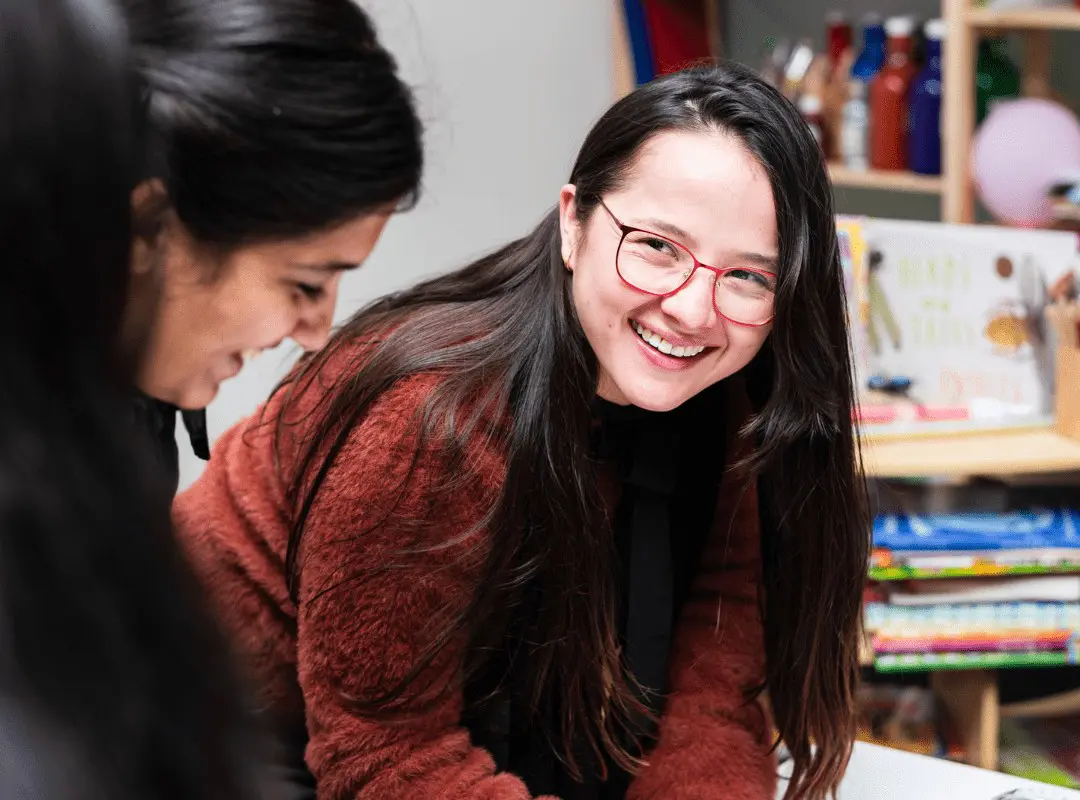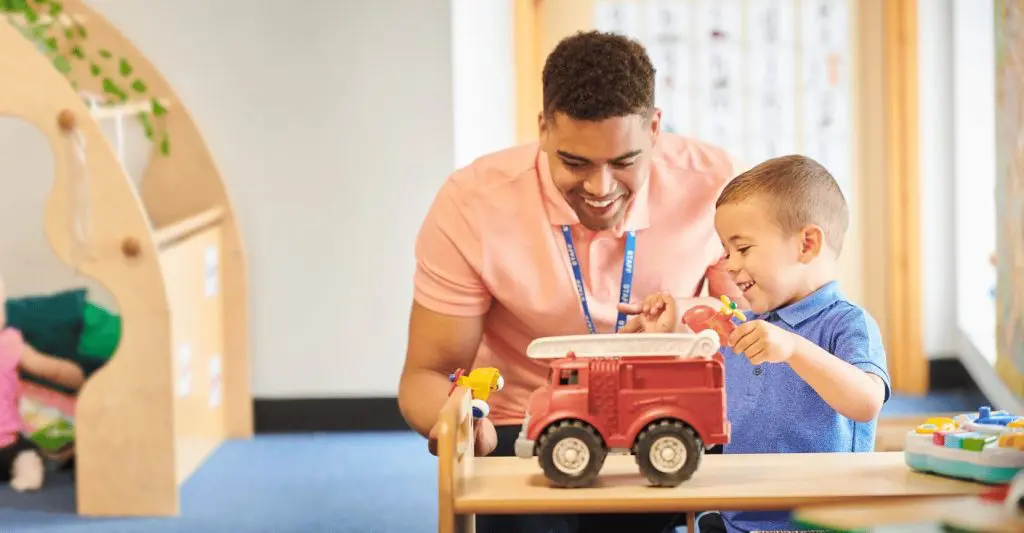Course Overview
This course provides you with a comprehensive understanding of early learning and development. You will gain the latest knowledge and skills to teach children from birth to five years old in various settings and professional roles. It is ideal for those who are passionate about nurturing holistic learning in children, and those looking to advance their related qualifications to become early childhood teachers.
Over four years, you will discover how to use play to teach subjects such as reading, maths, science, technology, arts, music, STEM and more to young children. You will also learn about safety, health and wellbeing; documentation, planning and assessment; sustainable practices; working with families and communities; diversity and inclusion practices; advocacy and research; educational leadership; and service management. With a strong foundation in educational theory and modern approaches, you will be empowered to create a curriculum that promotes children’s learning and development.
You will gain practical experience through 80 days of placements in different settings, where you can refine your teaching skills with young children. A final 30-day placement will strengthen your pedagogical and leadership abilities, getting you ready to enter the sector as a confident graduate early childhood teacher. This is a special opportunity to shape the future of our youngest learners.
This qualification is FEE-HELP approved for eligible applicants.
This course is recognised by the Australian Children’s Education and Care Quality Authority (ACECQA), qualifying graduates as early childhood teachers under the National Quality Framework.
BECE Accelerated Pathway: earn your teaching qualification in just two years
Our BECE Accelerated Pathway is specifically designed for domestic students who are diploma-qualified early childhood educators. This is ideal for those with two years of experience who are currently working in early childhood education and looking to fast track their qualification to becoming an early childhood teacher. Click here to learn more.
Key Information
| Award | Bachelor of Early Childhood Education |
| Duration | 4 Years Full Time (or Part Time Equivalent) |
| Study Mode | On Campus Online* |
| Locations | Adelaide Brisbane Melbourne Sydney Online |
| Intakes | February, May, September |
| Course Fees | Domestic (FEE-HELP available) International |
*International students may study up to one-third of the subjects in a course online. Domestic students may study the full course online.
Trimester 2, 2026 Applications Now Open
Career Opportunities
The Bachelor of Early Childhood Education prepares graduates for a rewarding career as an early childhood teacher. You will have the skills and knowledge to educate and care for children aged birth to five years in various settings such as preschools, childcare centres, occasional care, hospitals and educational centres.
The course also provides a pathway to further education in early childhood education and may be eligible for postgraduate studies.
Professional Recognition
This course is recognised by the Australian Children’s Education and Care Quality Authority (ACECQA), qualifying graduates as early childhood teachers under the National Quality Framework. Graduates may be eligible for teacher accreditation recognition via their relevant state regulatory authority.

Course Structure
You must successfully complete 32 subjects, totalling 192 credit points, to complete the Bachelor of Early Childhood Education. Each subject is specifically designed to provide you with the essential skills and understanding to excel in the field of early childhood education.
This course includes up to 4 supervised placement subjects with a minimum of 80 days.
If you plan to study full time, a full-time load is typically 8 subjects per year. For part-time students, you will typically complete 5 subjects per year. Please note that our academic year is structured into three trimesters, each consisting of 11 weeks of teaching followed by an exam week.
Delivery & Workload
This course has been designed to offer a dynamic and engaging learning experience. Your study will involve a mix of lectures, tutorials, self-directed study and workplace learning. Each academic year includes supervised placements, allowing you to gain 80 days of professional experience by the end of your course.
For each subject, allocate about three hours for lectures and tutorials. Additionally, you should allow approximately 10 hours per week per subject for self-directed study to complete prescribed readings, practice skills, conduct research, and complete assessments at your own pace.
Subjects
Year 1
Year 2
Year 3
Year 4
This subject explores the day-to-day practices of an early childhood teacher including:
- The daily responsibilities of early childhood professionals.
- Operations in early childhood settings.
- Conventions, frameworks, legislation, regulations, codes of conduct, duty of care, policy, procedures, and quality assurance processes.
- Engaging in pedagogical and educational programs and practices.
- The importance of relationships, partnerships and collaboration with families, communities and children.
- The significance of rights, dignity, equity, diversity, cultural competence and inclusion in early childhood.
- Respecting and including Aboriginal and Torres Strait Islander peoples and cultures.
Subject Code: EPRO101
Credit Points: 6
This subject covers the following components of play and documentation techniques used in early childhood education settings:
- The daily responsibilities of early childhood professionals.
- Operations in early childhood settings.
- Conventions, frameworks, legislation, regulations, codes of conduct, duty of care, policy, procedures, and quality assurance processes.
- Engaging in pedagogical and educational programs and practices.
- The importance of relationships, partnerships and collaboration with families, communities and children.
- The significance of rights, dignity, equity, diversity, cultural competence and inclusion in early childhood.
- Respecting and including Aboriginal and Torres Strait Islander peoples and cultures.
Subject Code: ECUR102
Credit Points: 6
This subject explores the following components of child development and how they are applied in early childhood teaching and curriculum.
- Genetics and growth in the first eight (8) years.
- Developmental theories, influences, and perspectives.
- Domains of child development and learning behaviours.
- Brain development, structure, and neuroscience in the early years.
- Holistic child development and its impact on pedagogical practice.
Subject Code: EDEV103
Credit Points: 6
This subject covers various aspects of supporting, facilitating, and promoting diversity, equity, cultural responsiveness, and inclusivity in early childhood contexts including:
- The significance of rights, dignity, equity, diversity, cultural responsiveness, and inclusion.
- Understanding relevant conventions, frameworks, legislation, regulations and codes of conduct.
- Linking educational frameworks and curriculum principles, capabilities, and practices.
- Exploring cultural competence in relation to cultural identity, cultural considerations and promoting awareness of diversity, equity, and inclusivity in the early years.
- Using inclusive teaching methods to educate young children about cultural diversity, prejudice, respect and belonging in early years curriculum provision.
Subject Code: EPRO104
Credit Points: 6
Pre-Requisites: EPRO101 Professional Practice
This subject explores the following aspects of supporting, facilitating, and promoting the holistic wellbeing of infants and young children in early childhood contexts.
- National regulatory considerations for wellbeing, health, safety, and nutrition.
- Providing care to infants, toddlers, and young children aged 3 to 8 years.
- Ensuring children’s safety in service environments, including protection from maltreatment (abuse and neglect) and handling emergency situations.
- Managing children’s health, including screening, immunisation, medication administration, illness management, allergies, and special medical conditions.
- Promoting children’s nutrition through understanding dietary guidelines, food concepts, and food preparation safety.
- Understanding the interconnectedness of physical, mental, social, and emotional health for children’s overall wellbeing.
- Planning for and teaching health, safety, nutrition, and wellbeing to young children across a range of diverse contexts.
Subject Code: EPRO105
Credit Points: 6
This subject explores the following components of young children’s care and learning to facilitate early childhood education and care:
- Contemporary theories, approaches, models, and frameworks for teaching, educating, and responding appropriately to young children.
- Documentation, assessment, planning, implementation, and evaluation of learning opportunities for young children across the National Quality Framework Approved Learning Frameworks and Australian Curriculum.
- Fostering young children’s learning dispositions and holistic development in young children across all areas of early childhood curriculum provision.
Subject Code: ETCH106
Credit Points: 6
Pre-Requisites: ECUR102 Exploring Play and Documentation, EDEV103 Holistic Child Development
This subject explores the following components of supporting, facilitating, and promoting young children’s creativity across integrated curriculum provision in early childhood contexts.
- Fostering creativity and aesthetics through understanding theoretical foundations; the concepts of creativity and aesthetics; and how to promote creative and aesthetic learning opportunities.
- Planning and implementing creative experiences through understanding the role of children and teachers in creative activities; designing and implementing creative environments; and the interconnectedness of play, holistic development, and creativity.
- Facilitating creativity within the curriculum through art, drama, movement, music, language and literacy, mathematics and numeracy, humanities and social sciences, technologies, engineering and science.
- Teaching creativity across integrated curriculum through STEM, STEAM, STREAM and STEMIE
Subject Code: ETCH107
Credit Points: 6
In this subject, you will expand your developing understanding of the early childhood profession and expectations within the three to five age range in an education and care setting. Throughout the professional experience component of this subject, you will apply your professional knowledge and demonstrate pedagogical skills in the following focus areas:
- Professional practice
- Play and documentation techniques
- Holistic child development
- Diversity and equity
- Safety, health, and wellbeing
- Development, assessment, and planning
- Creativity and curriculum provision
Subject Code: PLAC907 or PLAC917
Credit Points: 6
Pre-Requisites: All Level 100 (Year 1) subjects
This subject explores the following components of theoretical perspectives and educational theories that influence early childhood teaching and learning:
- Recognising the theoretical influences underpinning global early childhood pedagogy and professional practice.
- Critically reflecting on and evaluating early childhood educational theoretical perspectives that influence teaching and children’s learning.
- Investigating developmental, socio-cultural, cultural-historical, socio-behaviourist, critical, post structuralism, post-modernism, and contemporary theories in relation to pedagogical implications in the teaching and learning environment.
- Identifying theories in children’s play and the domains of development and applying this in curriculum provision, the planning cycle and teaching practices.
Subject Code: EPRO201
Credit Points: 6
This subject examines the aspects of young children’s and early childhood teachers’ comprehension and support of exceptionality to foster inclusivity in early childhood environments, including:
- Contemporary inclusive education research, recommendations, strategies, and approaches to enhance the inclusion of children with exceptionalities and diverse learning needs.
- The characteristics of exceptionality that influence the inclusion of children in early childhood settings and curriculum provision.
- Recognising the barriers, limitations, modifications, and interventions needed to support inclusive curriculum provision and learning environments for children with exceptionalities.
- Engagement with inclusive approaches, perspectives, and teaching practices to support young children with exceptionalities in early childhood settings.
Subject Code: EDEV202
Credit Points: 6
This subject explores the following components of understanding and guiding behaviour to enable the provision of early childhood education and care to young children:
- Brain architecture and how early experiences shape the developing brain and influence young children’s behaviour.
- The significance of the links and connections between young children’s contexts, holistic development, and needs on their behaviour.
- Pedagogical strategies for understanding how to guide young children’s behaviour whilst facilitating their social-emotional skills through attachment, positive relationships, and interactions.
- Teaching strategies and approaches to support young children’s behaviour and nurture positive self esteem, wellbeing, self-regulation, and emotional intelligence.
- The importance of play, curriculum provision and identifying the early childhood teachers’ role in guiding behaviour to promote every child’s agency within the learning environment.
Subject Code: ETCH203
Credit Points: 6
This subject explores the following components of working with families and communities to provide early childhood education and care:
- Contemporary sociology, theories and influences of family and community contexts on young children’s development and learning.
- Social policy that influences the social behaviour, relationships, interactions, culture and contexts of children, families, and communities.
- The diversity, complexity, changing nature and challenging contexts encountered by families and the impact on children’s development in contemporary society.
- Contextualised research, projects, programs, resilience raising strategies and approaches to working with and supporting family and community contexts in early childhood education.
Subject Code: EPRO204
Credit Points: 6
This subject explores:
- Contemporary issues in sustainability and ethics including ecological, globalisation, indigenous, social, and cultural sustainability.
- Key concepts, theories, priorities, policies, and practices in education for sustainability.
- A range of pedagogical practices to support children’s knowledge, agency, and practices of sustainability both locally and globally.
- How to nurture children to become active citizens in sustainable practices.
- An identification of personal content knowledge and values relating to sustainability.
Subject Code: ETCH205
Credit Points: 6
This subject examines components of infant and toddler care and learning for early childhood education and care including:
- Contemporary theories, approaches, models, and frameworks for teaching, educating, and responding appropriately to infants and toddlers.
- Documentation, assessment, planning, implementation, and evaluation of learning opportunities for infants and toddlers.
- Fostering infant and toddler learning dispositions and holistic development across all areas of early childhood curriculum provision.
Subject Code: ETCH206
Credit Points: 6
Pre-Requisites: ECUR102 Exploring Play and Documentation, EDEV103 Holistic Child Development
This subject explores the elements of curriculum, pedagogy, and teaching strategies for early childhood education and care to young children including:
- Contextual theoretical perspectives on curriculum, pedagogy, and teaching.
- Contemporary perspectives on early childhood curriculum and approaches to curriculum.
- Effective pedagogy and teaching strategies for supporting young children’s learning and development.
- Integration of the Australian Professional Standards for Teachers into everyday practices within early childhood contexts.
Subject Code: ECUR207
Credit Points: 6
This subject enables you to explore your developing understanding of the early childhood profession and expectations in the birth to three age range of an education and care setting. Throughout the professional experience component of the subject, you will apply acquired professional knowledge and demonstrate pedagogical skills in the following focus areas:
- Theoretical Perspectives and Pedagogy
- Understanding and Supporting Exceptionality
- Understanding and Guiding Children’s Behaviour
- Working with Families and Communities
- Sustainability Perspectives in the Early Years
- Development, Assessment and Planning
- Curriculum Approaches and Teaching Strategies
Subject Code: PLAC908 or PLAC918
Credit Points: 6
Pre-Requisites: All Level 200 (Year 2) subjects plus PLAC907 Professional Experience 1 (3-5 years) or PLAC917 Professional Experience 1
This subject explores the following components of children’s language and literacy development from birth to six years:
- Various theories and approaches to language acquisition and literacy development including an understanding of how socio-cultural contexts shape literacy development within families, and the ways that parents and Early Childhood educators can work together to support development.
- Strategies for supporting the development of language and literacy within early childhood contexts, using both traditional and multimodal texts.
- The role of the teacher in supporting and assessing children’s language and literacy development and planning effective teaching that will extend learning.
Subject Code: ECUR301
Credit Points: 6
This subject explores various aspects of young children’s mathematics development including:
- The importance of building young children’s mathematical thinking and concepts through play.
- Theoretical bases for mathematics education,
- The role of the teacher in facilitating and enhancing mathematical concepts and skills with young children.
- Documenting, planning, and assessing for mathematics understanding, concepts, and skills in early childhood environments.
- Engage young children’s interest in and understanding of mathematics across a range of contexts.
Subject Code: ECUR302
Credit Points: 6
This subject covers various aspects of using digital technology and media for high-quality early childhood education and care, including:
- Evaluating literature, policies, and frameworks related to young children’s use of digital technology and media in the 21st century.
- Understanding the current digital technological landscape in early childhood contexts.
- Acquiring the knowledge, approaches and skills to support effective, ethical, and responsible use of digital technology and media in early childhood contexts.
- Using a range of pedagogical approaches that support playful and intentional approaches to digital citizenship and digital technology use within a diverse range of early childhood contexts.
- Using multimodal media for creating and consuming text, digital technology, coding, and robotics in teaching and learning with children.
Subject Code: ECUR303
Credit Points: 6
This subject explores the following components of designing curriculum and teaching young children literacy and numeracy in early childhood contexts:
- The connection between literacy and numeracy practices in early childhood within a broader socio-cultural context.
- Recognising diverse literacy and numeracy practices within communities and the importance of teachers acknowledging and appreciating this diversity for children, families, and communities.
- Literacy and numeracy for young children within the National Quality Framework Approved Learning Frameworks and Australian Curriculum.
- Pedagogical practices required to document, assess, plan and design play-based literacy and numeracy learning experiences in a range of environments and curriculum areas.
- Incorporating the Australian National Professional Standards for Teachers into the daily literacy and numeracy practices of an early childhood teacher.
Subject Code: ETCH304
Credit Points: 6 Pre-Requisites: ECUR301 Language and Literacy in the Early Years, ECUR302 Mathematics in the Early Years
This subject explores the following components of designing curriculum and teaching science and engineering to young children in early childhood settings. It covers:
- The importance of play-based learning in sparking children’s interest in science and engineering, as well as fostering inquiry-based learning habits.
- Understanding curriculum and play-based pedagogy to enhance science and engineering education for young children, including different thinking styles.
- Developing knowledge in the technical areas of science and engineering, and creating strategies to incorporate appropriate experiences into early childhood curriculum and planning.
Subject Code: ETCH305
Credit Points: 6
This subject focuses on enhancing your knowledge, skills and dispositions in music, dance and movement within early childhood education. You’ll explore how the arts impact children’s development and community identities. You will also document, assess, and apply a range of contemporary play-based teaching strategies to design and facilitate engaging experiences that develop children’s aesthetic and creative expressions through dance drama and music in early childhood settings and the community. The importance of integrated curriculum approaches to the arts will also be examined and put into practice.
Subject Code: ETCH306
Credit Points: 6
This subject explores the following components of contemporary art approaches to educating young children in early childhood contexts:
- The significance of creativity and visual and media art to children’s development, critical and creative thinking, play, and curriculum design.
- Teaching pedagogies that support, facilitate, and promote young children’s creativity across a variety of visual and media art learning opportunities, curriculum areas and the community.
- Documenting, assessing, planning, and designing engaging play-based visual and media art curriculum provision for young children.
- Integrating visual and media art within the curriculum through drama, movement, music, language and literacy, mathematics and numeracy, humanities and social sciences, technologies, science, and engineering.
Subject Code: ETCH307
Credit Points: 6
This subject enables you to integrate your developing understanding of the early childhood profession and the expected roles for children aged three to five in an education and care setting. During the professional experience component of the subject, you will use your acquired professional knowledge to demonstrate teaching and pedagogical skills in specific curriculum focus areas. These include:
- Communication, language, and literacy
- Mathematics and numeracy
- Digital technologies and media
- Science, engineering, STEM, and STEAM
- Music, dance, movement, and drama
- Visual and media arts
- Pedagogical documentation
Subject Code: PLAC909 or PLAC919
Credit Points: 6
Pre-Requisites: All Level 300 (Year 3) subjects plus PLAC908 Professional Experience 2 (0-3 years) or PLAC918 Professional Experience 2
This subject explores the following perspectives of inclusive education and teaching of young children in diverse early childhood contexts:
- Key theories, legislation, policy, and frameworks for informing inclusive education in early childhood settings.
- Contemporary inclusive education research to enhance and enrich the inclusion of children with additional needs into an early childhood education and care setting and curriculum.
- The significance of family and child perspectives in the design and construction of an inclusive educational environment for all children.
- Educational scholarship in applying approaches, perspectives, and teaching practices to design contemporary inclusive curricula, learning environments, and assessments for all children.
Subject Code: EPRO401
Credit Points: 6
This subject explores and combines various approaches to creating a contemporary curriculum for young children in early childhood education. It includes:
- Implementing modern curriculum in early childhood settings to engage with children in new ways.
- Exploring global educational theories shaping early childhood curriculum, teaching practices, and children’s learning.
- Exploring contemporary methods to observe, document, assess, plan, and teach young children.
- Making educational theories visible in children’s development, learning, and curriculum planning.
- Creating effective inquiry-based learning opportunities for young children using contemporary curriculum approaches.
Subject Code: ECUR402
Credit Points: 6
This subject examines the following contemporary approaches to Indigenous perspectives to provide early childhood education and care:
- Embracing the diversity, culture, practice, and beliefs of Aboriginal and Torres Strait Islander Peoples.
- Integrating Aboriginal and Torres Strait Islander culture and perspectives in early childhood education.
- Applying the principles of Reconciliation in early childhood curriculum.
- Using culturally responsive teaching strategies for Aboriginal and Torres Strait Islander curriculum across various subjects such as language, literacy, numeracy, mathematics, visual and media arts, music, dance, drama, health and physical wellbeing, science, engineering, technology, humanities, and social sciences
Subject Code: EPRO403
Credit Points: 6
This subject explores contemporary approaches to advocating for children’s rights and social justice in early childhood education and care, including:
- Empowering children’s rights education including their civil rights; education, leisure, and cultural activities; safety; health, family life; immigration, asylum seeker and refugee status; living standards; and Aboriginal and Torres Strait Islander children and their families.
- Teaching about advocacy and social justice, and applying this knowledge through pedagogical practices to support each child’s rights, identity, and wellbeing.
- Creating an inclusive early childhood curriculum with a focus on democracy and social inclusivity.
- Developing personal teaching, leadership, and management identities within the context of global social justice and advocacy.
Subject Code: EPRO404
Credit Points: 6
In this subject, you will:
- Understand the complex role, expectations, and requirements of an educational leader in maintaining the National Quality Framework, Australian Professional Teaching Standards, and other legislative requirements to support quality outcomes in early childhood contexts.
- Develop professional understanding of the elements and strategies of educational leadership to lead educators and guide the planning cycle process.
- Explore current approaches for educational leaders to support, lead, and mentor educators and teams in creating effective educational programs with high-quality outcomes for children, families, educators, and the wider community.
- Examine theoretical perspectives underpinning global early childhood pedagogy, professional practice, curriculum frameworks and young children’s learning.
Subject Code: ELDR405
Credit Points: 6
Pre-Requisites: ECUR402 Contemporary Curriculum in Early Childhood Education
This subject explores contemporary approaches to leadership and services management in early childhood contexts, including:
- Understanding the significance of early childhood leadership and service management for providing quality care and education to all stakeholders.
- Developing a leadership and management identity through understanding the skills and dispositions required for leading and managing various aspects within early childhood contexts such as compliance; financial obligations; marketing and promotions; workplace wellness and safety; recruitment and performance; team effectiveness and professional development; change; and innovation, learning and critical thinking.
- Acquiring the knowledge, skills, and practices to effectively handle communication, planning, analysis, and decision-making for service operations and ensure compliance with governing legislation and regulatory frameworks.
Subject Code: ELDR406
Credit Points: 6
This subject teaches you how to conduct practical research for early childhood education. You will explore research methods, develop research questions, collect and analyse data, and present findings clearly. You will also learn to analyse and evaluate research in the field of early childhood education, develop reflexive skills, initiate practitioner research and develop knowledge in an area of interest. You will learn communicate research outcomes effectively to a range of audiences. Additionally, you will draw connections between practitioner action research and educational leadership.
Subject Code: ELDR407
Credit Points: 6
Pre-Requisites: All Level 100, 200, 300, 400 (Year 1, 2, 3 and 4) subjects.
This final professional experience placement capstone subject allows you to apply what you’ve learned about early childhood education during a 30-day work placement. There are two streams to choose from:
Stream 1: Kindergarten engagement and pedagogical leadership in an early childhood service 0-5 years
Stream 2: Leadership in an early childhood service 0-5 years
Regardless of the chosen option, you will apply your knowledge and skills in:
- Inclusive perspectives in early childhood education
- Contemporary curriculum provision
- Indigenous perspectives
- Advocacy and social justice
- Educational leadership
- Leadership and service management
- Researching in early childhood education.
You are required to arrange a consultation with the Placements Coordinator prior to commencing study, to determine the most suitable stream for you based on your qualifications, current work situation, and previous experience in early childhood education.
Subject Code: PLAC910, PLAC920
Credit Points: 6
Co-Requisite: ELDR407 Researching in Early Childhood
Pre-Requisites: All Level 100, 200, 300, 400 (Year 1, 2, 3 and 4) subjects excluding ELDR407, plus PLAC907 or PLAC917 Professional Experience 1, PLAC908 or PLAC918 Professional Experience 2, PLAC909 or PLAC919 Professional Experience 3

Recognition of Prior Learning (RPL)
At Ikon, your past studies or work experience can be acknowledged through Recognition of Prior Learning (RPL) or Credit Transfer.
RPL evaluates your previous skills and experience against the learning outcomes of Ikon subjects, potentially exempting you from studying certain subjects. Credit Transfer allows your previous studies to contribute towards your qualification, granting credits based on matched content and learning outcomes between equivalent qualifications. These pathways could help you to fast track your qualification, reducing study time and tuition fees.
Study Pathways
Credit Pathways
Diploma of Early Childhood Education and Care (VET)
Graduates of a vocational Diploma of Early Childhood Education and Care may be eligible for entry into the second year of the Bachelor of Early Childhood Education. Eligible applicants may receive course credit for up to 66 credit points.
Diploma of Early Childhood Education (Ikon)
Diploma of Early Childhood Education graduates can advance directly into the third year of our Bachelor of Early Childhood Education. Eligible applicants will be guaranteed 96 credit points out of a total of 192 points for our Bachelor of Early Childhood Education.
Exit Pathways
After successfully completing the first two years of the Bachelor of Early Childhood Education you may choose to leave the course and exit with the award of Diploma of Early Childhood Education.

Entry Requirements
Domestic Students
International Students
Our entry pathways include:
- Recent Senior Secondary Education: This applies to those who have completed an Australian Senior Secondary Certificate (Year 12) or its equivalent within the past two years. For guaranteed entry into this course, you must have achieved an ATAR of 60 with a minimum of a NSW Band 4 in English (or equivalent).
- Applicants with Higher Education (HE) study must have undertaken a higher education qualification (or, partially completed a higher education qualification).
- Vocational Education and Training (VET) study: This requires completion of a vocational qualification at Diploma level or higher.
- Work/Life experience: If you have left senior secondary education more than two years prior to your application and have not undertaken VET or higher education study since then, you may be eligible based on your professional or work experience and/or any non-formal courses taken in preparation for tertiary study or relevant to the subject area. You must also submit a written admission statement outlining your reasons for pursuing the Bachelor of Early Childhood Education. For more information about writing your admissions statement, click here.
All applicants must submit a 600-word statement outlining their reasons for wanting to become an early childhood teacher. You may also be asked to participate in an informal interview with an Ikon representative.
To discuss the most suitable pathway for your circumstances, please contact us at 1300 613 801 Domestic: Ext 1, or email us on [email protected].
For more information, please refer to the following:
Student Profile
Application Process
Student Admissions Policy
Inherent Requirements
International applicants must meet both the academic and English language requirements to enter this course.
Academic Entry Requirements
Our academic entry pathways include:
- Recent Senior Secondary Education: This applies to those who have completed an Australian Senior Secondary Certificate (Year 12) or its equivalent within the past two years. For guaranteed entry, an ATAR of 65 is required.
- Applicants with Higher Education (HE) study must have undertaken a higher education qualification (or, partially completed a higher education qualification).
- Vocational Education and Training (VET) study: This requires completion of a vocational qualification at Diploma level or higher.
- Work/Life experience: If you have left senior secondary education more than two years prior to your application and have not undertaken VET or higher education study since then, you may be eligible based on your professional or work experience and/or any non-formal courses taken in preparation for tertiary study or relevant to the subject area. You must also submit a written admission statement outlining your reasons for pursuing the Diploma of Arts Therapy. For more information about writing your admissions statement, click here.
All applicants must complete the Learner Questionnaire found in the Application Form, demonstrating their inherent qualities and motivations to succeed in the course. You may also be asked to participate in an informal interview with an Ikon representative.
English Language Requirements
Applicants must demonstrate a sufficient level of English language proficiency. You should have an IELTS score of 6.5 (Academic) with no less than 6.5 in Speaking and no less than 6.0 in Listening, Writing, and Reading, or equivalent.
To discuss the best pathway for your circumstances, please contact us at [email protected]
For more information, please refer to the following:
Application Process
Student Admissions Policy
Inherent Requirements
Find Out More!
Complete the form below to download our course brochure and find out more about the Bachelor of Early Childhood Education.

